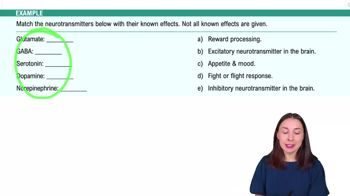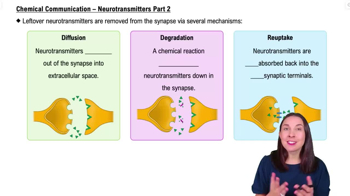Table of contents
- 1. Introduction to Psychology1h 43m
- 2. Psychology Research2h 20m
- 3. Biological Psychology2h 41m
- 4. Sensation and Perception28m
- 5. Consciousness and Sleep32m
- 6. Learning41m
- 7. Memory34m
- 8. Cognition37m
- 9. Emotion and Motivation35m
- 10. Developmental Psychology33m
- 11. Personality48m
- 12. Social Psychology41m
- 13. Stress and Health41m
- 14. Psychological Disorders44m
- 15. Treatment47m
3. Biological Psychology
Communication in the Nervous System
Struggling with Psychology?
Join thousands of students who trust us to help them ace their exams!Watch the first videoMultiple Choice
Endorphins help the body to
A
stave off depression.
B
regulate growth.
C
control pain.
D
regulate hormones.
 Verified step by step guidance
Verified step by step guidance1
Understand the role of endorphins in the body: Endorphins are neurotransmitters produced by the central nervous system and the pituitary gland. They are often referred to as 'feel-good' chemicals because they can produce a feeling of well-being.
Identify the primary function of endorphins: Endorphins are primarily known for their ability to inhibit the transmission of pain signals in the brain, which helps in controlling pain.
Differentiate between the functions listed: While endorphins can influence mood and have some impact on hormone regulation, their most direct and well-known function is related to pain control.
Consider the context of the question: The question is asking for the most accurate and direct function of endorphins, which is controlling pain.
Conclude with the correct answer: Based on the understanding of endorphins' primary role, the correct answer is that endorphins help to control pain.

 1:20m
1:20mWatch next
Master Electrochemical Communication with a bite sized video explanation from Hannah Gordils
Start learningRelated Videos
Related Practice
































